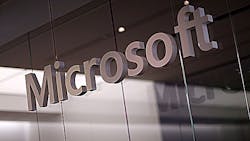Windows 10 Aims to Be Core of Connected Devices
REDMOND - Microsoft pulled back the curtain Wednesday on the upcoming Windows 10 operating system focused on bringing harmony to the diverse array of Internet gadgets in people's lives.
As it previewed the new operating system, Microsoft also unexpectedly added to the roster of modern gadgets with the unveiling of headgear that overlays holograms on the real world and lets wearers use their hands to interact with virtual objects.
By allowing users to work seamlessly over devices such as computers, tablets and smartphones, Microsoft hopes Windows 10 will renew its relevance in an age of mobile computing dominated by Apple and Google-backed Android software.
And in order to boost its take-up by the approximately 1.5 billion people around the world who use Windows-powered computers, in a change of policy Microsoft will allow free upgrades.
Microsoft also hopes to lure users with stunning new technology.
Nadella called HoloLens and Windows 10 a "mind-blowing" experience that will open a new type of computing.
"Today is a big day for Windows," Nadella said as Microsoft provided a look at its latest operating system at its headquarters in Redmond, Washington.
"We want to move from people needing Windows, to choosing Windows, to loving Windows; that is our bold goal for Windows."
Windows 10 is being designed with feedback from millions of "insiders" testing early versions of the operating system, Myerson said.
IE cedes to Spartan
Microsoft is so intent on distancing Windows 10 from its predecessors that it skipped directly from Windows 8, which failed to deliver on its promise as a platform for a variety of devices.
The Windows 10 design creates a foundation on which developers can build applications for smartphones, tablets, laptops, desktop computers, and Xbox One video game consoles, he said.
During the first year after the release of Windows 10, the operating system will be available as a free upgrade for computers running prior generation Windows 8.1 or Windows 7 software.
Microsoft said it will also keep Windows 10 upgraded during the lifetime of devices.
Personalized virtual assistant Cortana, and its touted ability to answer questions conversationally, will be now available on personal computers. Cortana made her debut on Windows-powered mobile devices.
Microsoft also unveiled a new Web browser code-named Spartan, which will have Cortana built in and ready to chime in at presumably helpful moments.
Spartan is poised to be the successor to Internet Explorer.
"Project Spartan is a new browsing experience tuned for being mobile and working across this family of devices," said Microsoft's Joe Belfiore.
Windows 10 is also designed to hook gamers, according to Xbox team leader Phil Spencer.
Along with modifications that allow for more sophisticated play on smartphones, an application for Xbox will let people use Windows 10-powered computers or tablets at home to play games with or against friends using one of the Microsoft consoles, Spencer demonstrated.
"I think there are lots of developers who want to bring their experiences to the Xbox," Spencer said.
Copyright Agence France-Presse, 2015
About the Author
Agence France-Presse
Copyright Agence France-Presse, 2002-2025. AFP text, photos, graphics and logos shall not be reproduced, published, broadcast, rewritten for broadcast or publication or redistributed directly or indirectly in any medium. AFP shall not be held liable for any delays, inaccuracies, errors or omissions in any AFP content, or for any actions taken in consequence.
